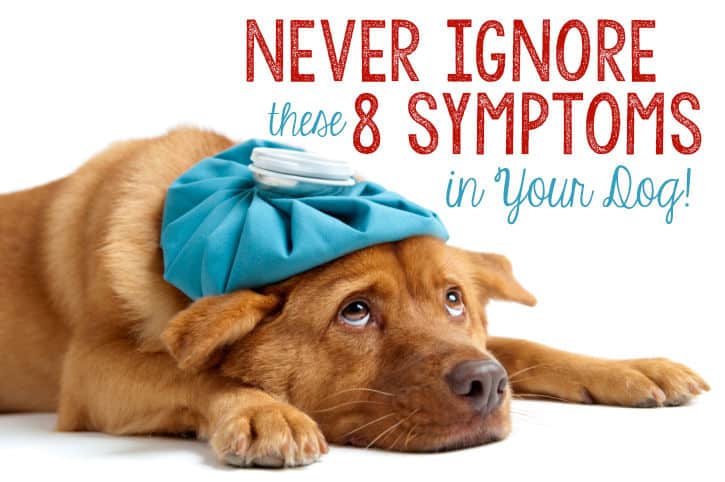Never Ignore These 8 Symptoms in Your Dog
[ad_1]
Because our dogs are essentially our children, it’s understandable to be concerned, if not slightly panicked, if something just seems “off.” Unfortunately, because our furkids can’t tell us when they’re feeling sick, we have to rely on their behavior, mood, and symptoms as an indication of how they’re feeling.

Although many seasoned pet parents have learned – perhaps after rushing to the emergency veterinarian and spending a small fortune at 2am – that it’s often alright to remain calm, monitor their dog, and schedule an appointment with the veterinarian at a more convenient time, these 8 symptoms should never be ignored.
1. Loss of Appetite
Most dog moms and dads know, the way to your best buddy’s heart is through his stomach! So, if your dog suddenly loses interest in his favorite past time (food!), there could be a problem. While there’s no need to panic if your pup seems uninterested in a meal – as long as he returns to the bowl fairly quickly – if he stops eating entirely, and can’t be enticed with tasty treats for more than 24-hours, it’s time to talk to your veterinarian.
2. Fever
Just as with humans, fever is always indicative of some underlying problem, like an infection or heat exhaustion. Normal body temperature for a dog is 100.5 to 102.5 degrees – any body temperature higher than 102.5 should be reported to your veterinarian. A prolonged fever of only a few degrees can cause irreversible damage to your dog’s brain and other organs.
The most accurate way to determine your dog’s temperature is rectally with a digital thermometer. Check out this guide for step-by-step instructions on Taking Your Dog’s Temperature. Never, ever, give your dog a human over-the-counter fever medication without clear instructions from your veterinarian as these medicines can lead to liver or kidney failure and death.
3. Lethargy or Extreme, Unexplained Fatigue
If your dog seems unusually tired, uninterested, or slow to respond to you or other environmental stimuli for more than a few hours, it’s time to call your veterinarian. Lethargy could be caused by any number of things, from poisoning, to pain, to heart disease and many illnesses or disorders in between. Your dog may be more tired than usual after an extra long walk, a big play date, or a day at the beach, for example, but should quickly return to her usual self after catching up on some rest.
4. Difficulty Breathing
If your dog is having difficulty breathing, she will need to be seen by a veterinarian immediately. Respiratory distress can be caused by an allergic reaction, heart disease, panic disorder, or choking, for example – all of which should be dealt with as an emergency. Sudden and prolonged shortness of breath can lead to a lack of oxygen reaching vital organs, heart failure, or death if not taken care of immediately.
5. Pacing or Restlessness Along With Gagging/Retching
The second leading cause of death among dogs is gastric dilatation volvulus, or bloat. Bloat is a life-threatening event that occurs most commonly in larger breed, deep-chested dogs, but can happen to any breed. Bloat occurs when air fills a dog’s stomach, putting pressure on surrounding organs and compressing veins in the abdomen. This pressure prevents blood from returning to the heart and the stomach can flip. Dogs experiencing bloat will often pace, become restless, and begin gagging and retching without vomiting.
Although the cause of bloat remains largely unknown, there are ways to reduce the likelihood of it occurring. Use a slow-feed bowl to prevent your dog from eating or drinking too quickly and swallowing large amounts of air. Limit your dog’s activity immediately following a meal. And, feed several small meals throughout the day as opposed to one large meal.
6. Trouble Urinating or Frequent, Painful Urination
As your dog’s keeper, you know his normal potty schedule. If your dog begins to urinate more frequently than normal, strains to urinate, or appears to be in pain (either whimpering, trembling, or excessively licking the area) during or immediately following a potty break, make an appointment with your veterinarian immediately. In some cases, he may simply be dealing with an easily treatable (yet incredibly painful) urinary tract infection or, this symptom may be indicative of a very serious, life-threatening problem.
7. Coughing
It’s not unusual for a dog to let out a single, random cough now and then, especially after eating a treat with too much enthusiasm or chewing voraciously on a stick or dog toy. A single cough, as long as it happens rarely and infrequently, is typically not too concerning. But, continuous or frequent coughing is generally a symptom of a bigger, more serious problem. Dogs can cough because of either illness, like kennel cough or pneumonia, after an injury to their trachea, because of heartworm or other heart-related disease, or because of serious lung disease or cancer, for example. A cough, while not usually an immediate emergency, should never be ignored.
8. Blood in Urine, Vomit, or Stools
Any appearance of blood in your dog’s urine, vomit, or stools should always be addressed with your veterinarian. While not always life-threatening, the causes of blood in your dog’s bodily fluids range from a simple, easily treatable infection, to a minor cut or scrape, to cancer, and any variety of causes in between. Blood can appear bright red, dull, or even black – so, keep an eye on your dog’s “duty” and report any unusual findings to your veterinarian.
Although these 8 symptoms should always be given attention, they may or may not indicate a life-threatening situation. It’s best to always remain calm, but vigilant when it comes to your dog’s health. Keep your veterinarian’s phone number, as well as the number of an emergency veterinarian in your area, handy in the event that your dog exhibits any of the symptoms named above. As a general rule, pet parents should also have a fully stocked pet first aid kit on hand to readily deal with other emergencies that might occur.
[ad_2]
Source link




